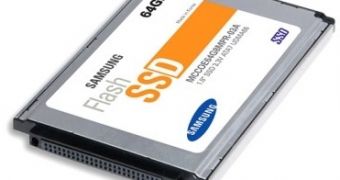Samsung is planning on delivering increased capacity hard-disk drives, and the company might release a 256 GB version in 2009. The new capacity will quadruple the company's current offering that can offer as much as 64 GB per solid-state drive.
According to Jim Elliott, vice president of memory marketing for Samsung Semiconductor, the company has just implemented its 64 GB version in Lenovo's ThinkPad X300 ultra-portable laptops and will start sampling its first 128 GB units in the second half of the year.
"Lenovo's use of a SATA II SSD as the only storage device for its premium ThinkPad X300 notebook underscores its commitment to performance excellence," said Elliott. "With the Samsung SATA II SSD, Lenovo is delivering the highest performance rates for rugged, ultra-light storage in an ultra-portable notebook," he added.
However, the device will first be addressed exclusively to system builders and hardware manufacturers, while the company will continue its research and development plans with PC vendors as Lenovo or Dell, in order to release SSD drives with capacities ranging from 64 GB to 128 GB.
The company official, however, did not comment upon whether Samsung would release the new drives on the market or keep them for system vendors only. At the same time, Elliott refused to detail upon the upcoming 256 GB drives.
Solid-state drives are now rare pieces of storage, given their increased price and low storage space provided, but things will change in the long term. Samsung claims that SSDs might replace older spinning platters, because they are lighter, more energy-efficient and faster than conventional hard-disks. For instance, Samsung's SSD drives come with a SATA-II interface, that can deliver three to five times the speed of a hard drive. At the same time, it only weighs 73 grams and takes up 30 percent less power.
The most important obstacle in SSDs' catching ground is their fabulous price, but things are about to change with the development of the multilevel cell technology that will be massively introduced on the market in the second half of the year. Single-level cell-based solid state drives come at a price of $600 per 64 GB of storage, but MLCs are far cheaper, although not as powerful as SLCs.

 14 DAY TRIAL //
14 DAY TRIAL //